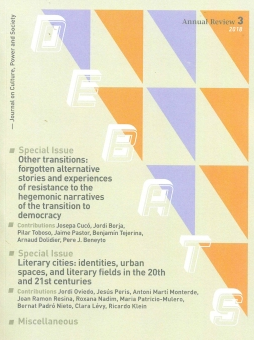The revolutionary left and the transition: dynamics and processes
Resum
The aim of this article is to present, in rough outlines, the relationship between the Spanish revolutionary left and the transition process in Spain, and their mutual impact on each other. Moreover, we also address, in a synthetic way, the stages of formation, boom, and decline in the various radical forces. These clusters shared ideologies, expectations, and political cultures, as well as approaches, proposals, and forms of operation, with their homonymous European counterparts. They shared a common background upon which the dictatorship and experience in the Spanish context also left a mark, and this strongly determined the forms of action and the organisational structure of several groups which considered the anti-Francoist fight a synonym for the revolutionary fight. Their evolutionary cycle was, as a whole, linked to the ups and downs of political change during the Franco regime, and in its crisis they represented a crucial motor for social agitation and mobilisation. The rise of democracy in Spain is still developing, albeit in parallel to the decline of these collectives. After successive electoral failures and their conversion into the extra-parliamentary left, these various groups have gone into a rapid process of descent in which widespread weakening, fusions, sectarianism, and dissolution are combined in all their possible forms.Descàrregues
Descàrregues
Publicades
Com citar
Número
Secció
Llicència
Sense perjudici del que disposa l'article 52 de la Llei 22/1987 d'11 de novembre de Propietat Intel·lectual, BOE del 17 de novembre de 1987, i conforme a aquest, els/les autors o autores cedeix/en a títol gratuït els seus drets d'edició, publicació, distribució i venda sobre l'article, per tal que siga publicat a Debats. Revista sobre cultura, poder i societat.
Debats. Revista de cultura, poder i societat es publica sota el sistema de llicències Creative Commons segons la modalitat “Reconeixement – NoComercial (by-nc): Es permet la generació d’obres derivades sempre que no se’n faça un ús comercial. Tampoc no es pot fer servir l’obra original amb finalitats comercials”.
Així, quan l’autor/a envia la seva col·laboració, accepta explícitament aquesta cessió de drets d’edició i de publicació. Igualment autoritza Debats. Revista de cultura, poder i societat la inclusió del seu treball en un fascicle de la revista perquè es puga distribuir i vendre.











